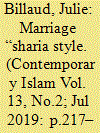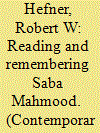|
|
|
Sort Order |
|
|
|
Items / Page
|
|
|
|
|
|
|
| Srl | Item |
| 1 |
ID:
167511


|
|
|
|
|
| Summary/Abstract |
This article responds to recent research calling for more nuanced discussions of Muslim political and social activist subjectivities (Ahmed 2011; Maira 2016; Mansouri et al. 2016; Nagel and Staeheli 2011). We analyze community and social justice activism among Muslims in Milwaukee through the lens of the American prophetic tradition. We argue that Muslim leaders in Milwaukee represent their activism as part of this tradition, and that they draw upon a complex of religious, social and political discourses and social practices. These include American civil rights activism, Islamically inspired social action, and a desire to engage in placemaking that responds to the specific conditions of Milwaukee, a city that features intense racial segregation, dense pockets of poverty, and increased immigration from the Arabo-Islamic world. Thus, we see a pluralization of Muslim social activist subjectivity: social justice activism which is religiously based, related to the civil rights tradition, and which is also highly attuned to the specific ways in which Muslims may practice a politics of belonging in this Midwestern city.
|
|
|
|
|
|
|
|
|
|
|
|
|
|
|
|
| 2 |
ID:
167513


|
|
|
|
|
| Summary/Abstract |
Contemporary mobile phone technology has brought millions of apps into the pockets of users, including a wide variety oriented towards religious concerns. Such apps appear to be creating new forms of religious engagement, a process that is particularly visible within Indonesia. This paper will examine the so-called ‘Aa Gym’ app, one of the Islamic apps launched by the Indonesian popular preacher, Abdullah Gymnastiar, an early adopter of mobile technology for religious purposes. The paper argues that the Aa Gym app illustrates how the mediatization of religion inherent in mobile technologies is reshaping the way that Indonesians engage with Islamic teachings. First, ‘Aa Gym’ app has created new forms of religious engagement through an extension of religious interaction and communication in a media landscape. Second, ‘Aa Gym’ app has described that media has become a new site for the discovery of religious meanings as a result of the spread of religious authority. Thirdly, ‘Aa Gym’ app is a kind of embodiment of accommodation of media logic performed by the religious figure in order to remain accessible to the public which is increasingly media-saturated.
|
|
|
|
|
|
|
|
|
|
|
|
|
|
|
|
| 3 |
ID:
167514


|
|
|
|
|
| Summary/Abstract |
The growing visibility of Islam in the public spaces of Western societies is often interpreted in the media as a sign of Muslim radicalisation. This article questions this postulate by examining the flourishing Muslim marriage industry in the UK. It argues that these ‘halal’ services, increasingly popular among the young generation of British Muslims, reflect the semantic shifting of categories away from the repertoire of Islamic jurisprudence to cultural and identity labels visible in public space. Informed by long-term ethnographic fieldwork in the British field of Islamic law, this article examines a Muslim speed-dating event, which took place in central London in 2013. It investigates how Islamic morality is maintained and negotiated in everyday social interactions rather than cultivated via discipline and the pursuit of virtuous dispositions. Using Goffman’s “frame analysis” and his interpretation of the social as a space of “performances” as well as recent anthropological reflections on “ordinary ethics” (Lambek) and “everyday Islam” (Schielke, Osella and Soares), it examines the potential for such practices to define the contours of a new public culture where difference is celebrated as a form of distinction.
|
|
|
|
|
|
|
|
|
|
|
|
|
|
|
|
| 4 |
ID:
167510


|
|
|
|
|
| Summary/Abstract |
Saba Mahmood's untimely passing on March 10, 2018 was a tragic loss for family, friends, and colleagues, as well as for cultural anthropologists inspired by her scholarship over the past two decades. Her influence has been no less far-reaching in contemporary Islamic and gender studies, as well as the anthropology of ethics. It is against the backdrop of her legacy that this essay seeks to pay homage to and critically reflect on Mahmood's scholarship. It focuses on and assesses Mahmood's contributions as an anthropologist of Islam, subjectivity, and ethics, paying particular attention to the debates that have emerged in the wake of her scholarship on the ethics of piety, the ambivalent nature of subjectivity, and the meanings of freedom and tradition. The assessment suggests that there is an unresolved tension between Mahmood's experience-near reflections on the ethical care of the pious self, on one hand, and her more sweeping critiques of freedom and the liberal project. The essay concludes with some thoughts on where the anthropology of Islam is moving with regard to ethics, plurality, and the ambivalence of subjectivity.
|
|
|
|
|
|
|
|
|
|
|
|
|
|
|
|
| 5 |
ID:
167512


|
|
|
|
|
| Summary/Abstract |
Officially recognized as an Indigenous System of Medicine in India, Unani has been intimately connected to Muslim culture in South Asia. However, this connection has been downplayed by the government of India, which stressed the secular character of Unani and its Greek origins. Hijamah, or cupping therapy, is considered to be part of the regimental therapies of Unani medicine. Because hijamah has been mentioned in several Hadiths, it is also considered prophetic medicine. After what seems to be a long neglect of hijamah in the practice of Unani medicine, various hakims (Unani practitioners) are now promoting this therapy as a “forgotten Sunna.” This paper attends to the revival of hijamah in India at the intersections of Unani and prophetic medicine through an examination of clinical practices and advertisements. It argues that this revival is contributing to a re-Islamization of Unani medicine. The article suggests that this development is not just the product of an interest among Muslims in India to live according to the Sunna, but it is also influenced by the global market of Complementary and Alternative Medicine which the government of India seeks to lead.
|
|
|
|
|
|
|
|
|
|
|
|
|
|
|
|
|
|
|
|
|